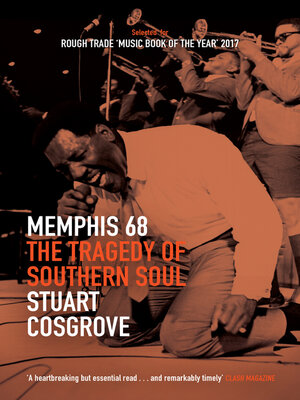
Sign up to save your library
With an OverDrive account, you can save your favorite libraries for at-a-glance information about availability. Find out more about OverDrive accounts.
Find this title in Libby, the library reading app by OverDrive.



Search for a digital library with this title
Title found at these libraries:
| Library Name | Distance |
|---|---|
| Loading... |
Second in the award-winning soul music trilogy following Detroit 67—featuring Memphis artists Isaac Hayes, Mahalia Jackson, Otis Redding, and others.
In the 1950s and 1960s, Memphis, Tennessee, was the launchpad for musical pioneers such as Aretha Franklin, Elvis Presley, Johnny Cash, Al Green, and Isaac Hayes, and by 1968, it was a city synonymous with soul music. It was a deeply segregated city, ill at ease with the modern world and yet to adjust to the era of civil rights and racial integration. Stax Records offered an escape from the turmoil of the real world for many soul and blues musicians, with much of the music created there becoming the soundtrack to the civil rights movement.
The book opens with the death of the city’s most famous recording artist, Otis Redding, who died in a plane crash in the final days of 1967, and then follows the fortunes of Redding’s label, Stax/Volt Records, as its fortunes fall and rise again. But as the tense year unfolds, the city dominates world headlines for the worst of reasons: the assassination of civil rights leader Martin Luther King Jr.
Winner of the Penderyn Music Book Prize in 2018
“As ever, Cosgrove’s lucid, entertaining prose is laden with detail, but never at the expense of the wider narrative. Hinging on that Memphis destination, he traces the savage dichotomy at the city’s heart: it was the site of multi-racial soul imprint Stax, but also the place where Martin Luther King was killed. A heartbreaking but essential read, and one that feels remarkably timely.” —Clash Magazine
In the 1950s and 1960s, Memphis, Tennessee, was the launchpad for musical pioneers such as Aretha Franklin, Elvis Presley, Johnny Cash, Al Green, and Isaac Hayes, and by 1968, it was a city synonymous with soul music. It was a deeply segregated city, ill at ease with the modern world and yet to adjust to the era of civil rights and racial integration. Stax Records offered an escape from the turmoil of the real world for many soul and blues musicians, with much of the music created there becoming the soundtrack to the civil rights movement.
The book opens with the death of the city’s most famous recording artist, Otis Redding, who died in a plane crash in the final days of 1967, and then follows the fortunes of Redding’s label, Stax/Volt Records, as its fortunes fall and rise again. But as the tense year unfolds, the city dominates world headlines for the worst of reasons: the assassination of civil rights leader Martin Luther King Jr.
Winner of the Penderyn Music Book Prize in 2018
“As ever, Cosgrove’s lucid, entertaining prose is laden with detail, but never at the expense of the wider narrative. Hinging on that Memphis destination, he traces the savage dichotomy at the city’s heart: it was the site of multi-racial soul imprint Stax, but also the place where Martin Luther King was killed. A heartbreaking but essential read, and one that feels remarkably timely.” —Clash Magazine







